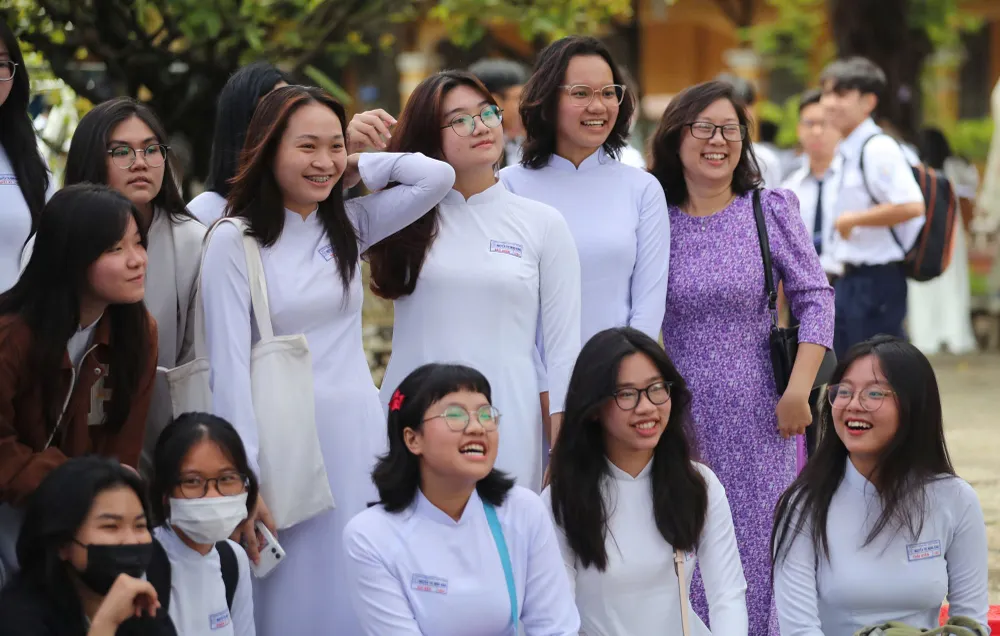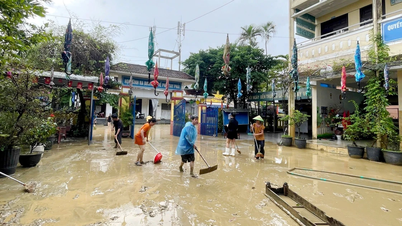1. One afternoon after school, as usual, Nhat Minh, an 11th grade student at a high school in District 3 (HCMC), ran straight into the kitchen to see what his mother was cooking today. Unlike every other day, the dining table was empty, the kitchen was quiet, without his mother's nagging voice as usual. Minh wearily walked upstairs, opened his mother's room door, and saw his mother lying tiredly on the bed. Hearing Minh enter, Thanh Hien - Nhat Minh's mother, shouted out the door: "Mom left 500,000 VND on your desk. Mom didn't cook today, take the money and order food to eat." There was no response from her son. The door closed gently. Thanh Hien fell asleep tiredly without knowing it.
Startled from a short nap, Ms. Thanh Hien opened the door and walked out. Her husband and children had already had dinner outside, but no one asked what she wanted to eat or bought her food. Her body was exhausted due to a high fever, her heart felt as if someone was squeezing it, and two lines of tears suddenly flowed down her pale face. Feeling sad for her only son, Ms. Thanh Hien blamed her husband more for his indifference, not asking about or worrying about his wife's health. When love and care come from one side, the bond between family members becomes loose. The good tradition of "when one horse is sick, the whole stable stops eating" is no longer true in many modern families, where each member is inseparably attached to their mobile phones, and the words of asking about and caring for each other gradually become less frequent. That habit spreads to relationships outside the family such as relatives, friends, and colleagues, causing people to gradually lose interest and understanding, becoming cold and indifferent when witnessing the difficulties of those around them.

2. During recess at a middle school in District 1 (HCMC) recently, while engrossed in playing tag with his classmates, an 8th grade student bumped into a female teacher who was walking across the schoolyard. The sudden collision caused her to lose her balance and fall flat on the schoolyard. After a few seconds of "freezing", the student hurriedly ran away for fear of having his name written on it and having his conduct points deducted. A group of female students standing nearby quickly ran over to help her stand up and pick up the pile of documents scattered in the schoolyard. Returning to the teacher's room, what made the teacher most upset was not the scratch on her leg but the student's attitude after the collision. If only the student had said sorry to her, there would not have been any annoyance or concern.
In the teacher-student relationship, the mindset of “Without a teacher, you can’t do anything” has gradually been replaced by “If you want your children to be good at learning, you must love their teachers”. In which, the word “love” is understood in a new sense as “having a front and a back” in a fair and mutually beneficial way, not the previous meaning of respecting and appreciating teachers. It can be seen that the “envelope culture” and the overemphasis on the goal of “Putting students at the center” have caused the image of teachers to lose its inherent noble meaning in the eyes of a few people.
In the past, when entering school, parents had to bow to teachers even though the teachers were younger than the students' parents. But now, in many parent-teacher meetings, it is easy to see images of teachers bowing to parents. After the meeting ends, parents are sent a link to evaluate the quality of the meeting even though they just sat on their phones the whole time. Many families completely entrust the responsibility of raising and educating a child to the school. The relationship between teachers and parents, and more broadly, between school and family, has changed, invisibly negatively affecting the thinking of children.
3. The changing social context has become a barrier to preserving the nation's fine traditional cultural values. It is undeniable that integration has a positive impact on each individual in the social community, such as increasing autonomy, independence, creativity, and the ability to apply science and technology. However, in order for the development goal to not stray far from the requirement of preserving the national cultural identity, it is necessary to promote the role of setting an example in society. In particular, the family - the first cultural environment of a child - needs to maintain appropriate behavioral habits and build a good personality foundation for them. Next, schools and more broadly, society have the responsibility to nurture and help the young generation perfect their personalities, become beautiful people, and be useful to the community.
Source: https://www.sggp.org.vn/giu-truyen-thong-trong-thoi-hien-dai-post799647.html





![[Photo] Prime Minister Pham Minh Chinh chairs a meeting on housing policy and the real estate market.](https://vphoto.vietnam.vn/thumb/1200x675/vietnam/resource/IMAGE/2025/11/11/1762838719858_dsc-2107-jpg.webp)


































































































![Dong Nai OCOP transformation: [Article 4] Reaching national standard products](https://vphoto.vietnam.vn/thumb/402x226/vietnam/resource/IMAGE/2025/11/11/1762825820379_4702-cac-san-pham-trai-cay-chung-nhan-ocop-nongnghiep-174649.jpeg)



![Dong Nai OCOP transition: [Article 3] Linking tourism with OCOP product consumption](https://vphoto.vietnam.vn/thumb/402x226/vietnam/resource/IMAGE/2025/11/10/1762739199309_1324-2740-7_n-162543_981.jpeg)






Comment (0)